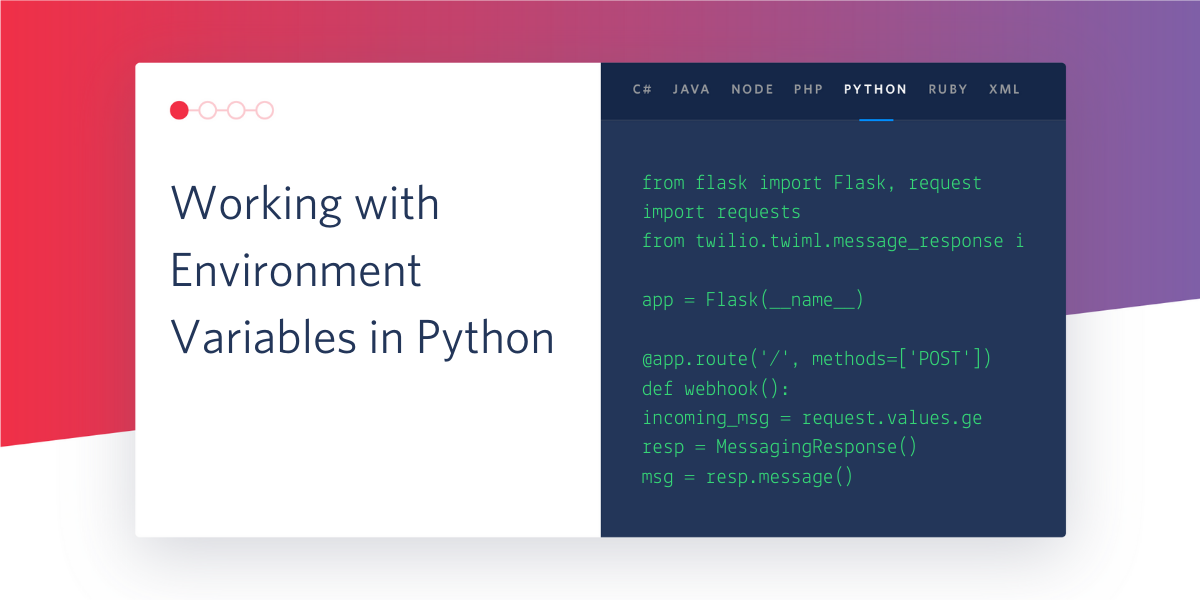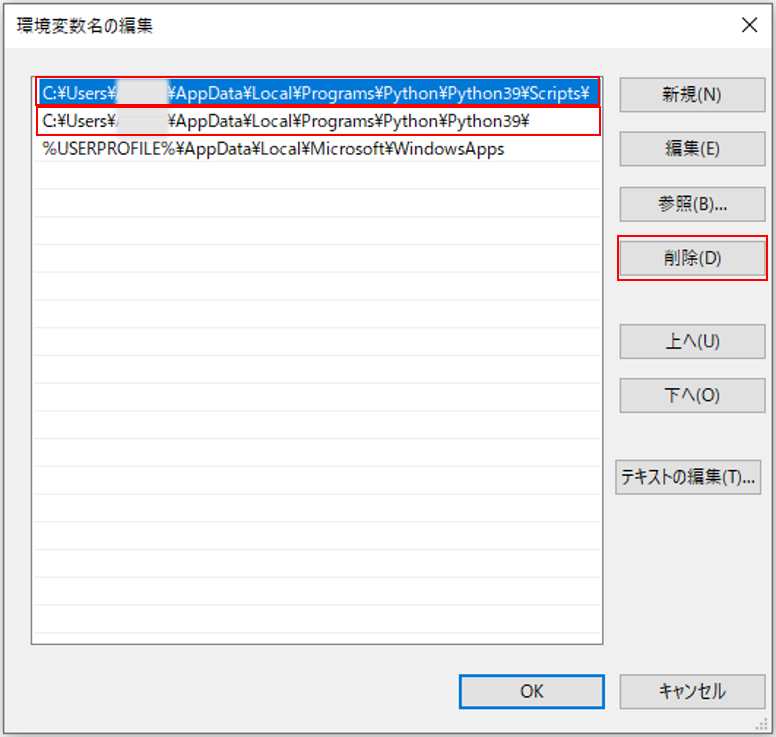Read Env Var Python
Read Env Var Python - Base_url = my_base_url then import the module into your python. The problem with the above expression is that it is going to fail with a keyerror in case environment variable env is not present in the environment. Web open notepad and write the environment variables in it. Web try using the following: Import os from dotenv import load_dotenv load_dotenv () my_env_var = os.getenv ('my_env_var') my_env_var=this is my env var. For example, my_env_var=this is my env var content. save this file with a name followed by the.env extension, for example, config.env. This will create a.env file. Environment variables can be set in different ways in different operating systems that i have explained in my previous article. Os.getenv ('myvar') from the documentation: Web within your python code you can read env variables like:
Web to read environment variables from a python script or a jupyter notebook, you would use this code—assuming you have a.env file in the directory where your script or notebook lives. The problem with the above expression is that it is going to fail with a keyerror in case environment variable env is not present in the environment. Web environment variables are accessed through the os module in python. Import os env_var = os.environ ['env'] print (f'currently working in {env_var} environment'. Web my_env_var_value = strtobool(os.getenv(env_var, false)) and yes, this will throw an error if the environment variable has some value that is neither true nor false. Web try using the following: Environment variables can be set in different ways in different operating systems that i have explained in my previous article. Import os username = os.environ['my_user'] password = os.environ['my_pass'] print(running with user: Web nearly every programming language has a package or library that can be used to read environment variables from the.env file instead of from your local environment. Alternatively, if you configured the path and pathext variables for your python installation:
Explore and unlock the recipe to transform your. Web having set environment variables in your app can spare you a great many headaches (and potentially, heart attacks too :p), as they are useful in hiding the sensitive information inside your.env. Os.getenv ('myvar') from the documentation: For python, that library is. Web first install python decouple into your local python environment. The use of venv is now recommended for creating virtual environments. Import os from dotenv import load_dotenv load_dotenv () my_env_var = os.getenv ('my_env_var') my_env_var=this is my env var. You can vote up the ones you like or vote down the ones you don't like, and go to the original project or source file by following the links above each example. Web open notepad and write the environment variables in it. Alternatively, if you configured the path and pathext variables for your python installation:
python env and venv Allen Parsons Tech Page
For example, my_env_var=this is my env var content. save this file with a name followed by the.env extension, for example, config.env. Environment variables can be set in different ways in different operating systems that i have explained in my previous article. Web open notepad and write the environment variables in it. Web within your python code you can read env.
GitHub mattseymour/pythonenv Read .env file (key>value) setting
Web nearly every programming language has a package or library that can be used to read environment variables from the.env file instead of from your local environment. $ touch.env # create a new.env file $ nano.env # open the.env. Os.getenv (varname [, value]) return the value of the environment variable varname if it exists, or value if it doesn’t. Import.
pythondotenv How to Load the Secret Information from .env File Data
$ touch.env # create a new.env file $ nano.env # open the.env. Import os from dotenv import load_dotenv load_dotenv () my_env_var = os.getenv ('my_env_var') my_env_var=this is my env var. Import os env_var = os.environ ['env'] print (f'currently working in {env_var} environment'. Web to retrieve an environment variable without causing an error if it doesn't exist, we can use the os.environ.get.
Python 04 VAR (VARiables) Programming Негіздері Для Начинающих
On windows, invoke the venv command as follows: For python, that library is. We now need to create a python script in the same directory where the.env file is located to read env files in python. Web my_env_var_value = strtobool(os.getenv(env_var, false)) and yes, this will throw an error if the environment variable has some value that is neither true nor.
SOLVED How to read env var in Node.js [With Examples] GoLinuxCloud
Environment variables can be set in different ways in different operating systems that i have explained in my previous article. $ touch.env # create a new.env file $ nano.env # open the.env. 24 python code examples are found related to read env . Alternatively, if you configured the path and pathext variables for your python installation: Web environment variables are.
python env and venv Allen Parsons Tech Page
Now we are trying to read. For python, that library is. Web to retrieve an environment variable without causing an error if it doesn't exist, we can use the os.environ.get () method. Base_url = my_base_url then import the module into your python. Web my_env_var_value = strtobool(os.getenv(env_var, false)) and yes, this will throw an error if the environment variable has some.
Working with Environment Variables in Python
Web python read environment variables can be read and set with the help of functions provided by os modules which help to interact with the operating system. This method takes the variable name as an argument and returns its value. Now we are trying to read. Alternatively, if you configured the path and pathext variables for your python installation: $.
javascript How to set env variables across the app with createreact
Web to retrieve an environment variable without causing an error if it doesn't exist, we can use the os.environ.get () method. Web my_env_var_value = strtobool(os.getenv(env_var, false)) and yes, this will throw an error if the environment variable has some value that is neither true nor false. For example, my_env_var=this is my env var content. save this file with a name.
Var Meaning In Python MEANCRO
How to read environment variables? Access environment variables using os.environ. Web python read environment variables can be read and set with the help of functions provided by os modules which help to interact with the operating system. Web to read, print and set environment variables, the “os.environ.get ()” method, os.environ dictionary, is used in python. Explore and unlock the recipe.
Python アンインストール Play anything
Access environment variables using os.environ. How to read environment variables? You can use it to access individual environment variables by their name or iterate over all environment variables. Explore and unlock the recipe to transform your. Web to read environment variables from a python script or a jupyter notebook, you would use this code—assuming you have a.env file in the.
Web Nearly Every Programming Language Has A Package Or Library That Can Be Used To Read Environment Variables From The.env File Instead Of From Your Local Environment.
Os.getenv (varname [, value]) return the value of the environment variable varname if it exists, or value if it doesn’t. Storing the jwt_secret_key, port of the express. Web to read, print and set environment variables, the “os.environ.get ()” method, os.environ dictionary, is used in python. Alternatively, if you configured the path and pathext variables for your python installation:
Explore And Unlock The Recipe To Transform Your.
Web to read environment variables from a python script or a jupyter notebook, you would use this code—assuming you have a.env file in the directory where your script or notebook lives. $ touch.env # create a new.env file $ nano.env # open the.env. Base_url = my_base_url then import the module into your python. Web within your python code you can read env variables like:
You Can Use It To Access Individual Environment Variables By Their Name Or Iterate Over All Environment Variables.
Web if you are new to mern stack development you have possibly heard about.env file which is usually used for the privacy of some important variables e.g. Import os username = os.environ['my_user'] password = os.environ['my_pass'] print(running with user: Web my_env_var_value = strtobool(os.getenv(env_var, false)) and yes, this will throw an error if the environment variable has some value that is neither true nor false. Web changed in version 3.5:
%S % Username) Then When You Run.
Import os env_var = os.environ ['env'] print (f'currently working in {env_var} environment'. 24 python code examples are found related to read env . For python, that library is. Access environment variables using os.environ.



![SOLVED How to read env var in Node.js [With Examples] GoLinuxCloud](https://www.golinuxcloud.com/wp-content/uploads/use-dotenv-e1656387692760.png)




